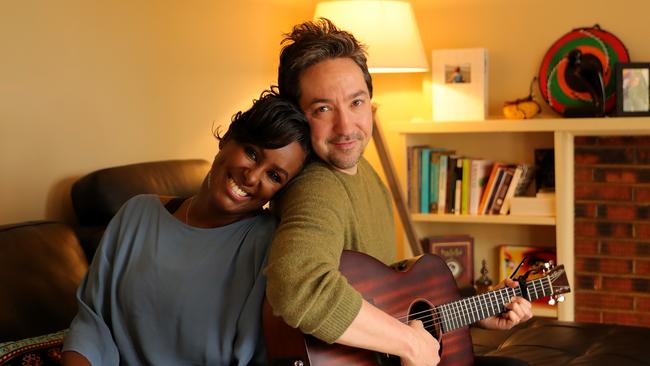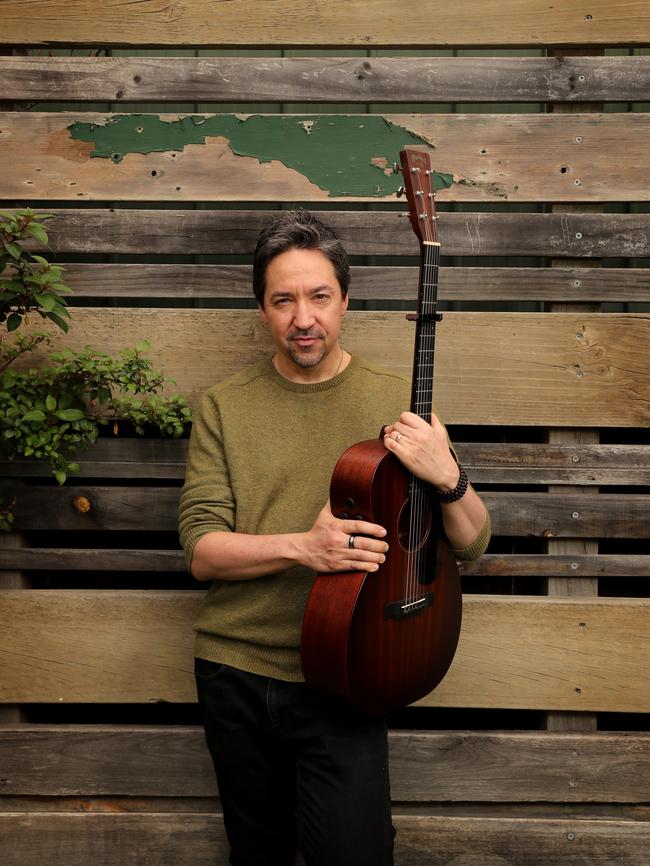Jon Toogood, The Adults, Haja, Shihad, Sudan, aghani al-banat
His wedding in Khartoum gave Kiwi singer-songwriter Jon Toogood two precious gifts.

It was on the third day of his wedding that Jon Toogood first heard it. As he watched his wife, Dana, performing a sensual, traditional dance whose moves told the story of their courtship, he was the only man in a room of 300 women. She wore a red Sudanese dress known as a toub; he wore a white and red robe known as a jalabiya. The scene was about as far from his upbringing in Wellington, New Zealand, as could be imagined.
While being mesmerised by the sight of the most beautiful woman he had ever seen performing this intimate and sacred ritual, his musician’s mind was captivated by the unusual rhythms and vocal melodies provided by a band of female musicians playing an urban fusion genre known as aghani al-banat.
It was January 2014, in the Sudanese capital of Khartoum, and to get to this crucial point in their relationship took “years of hardcore trying to convince her parents we were serious, and there was no f..king stopping us from getting married”, as Toogood puts it. “In Sudan, it’s not about the two people getting married; it’s about the two families that are involved. Is this wedding beneficial to each family?”
Into this careful checking process of a family’s reputation three generations back comes a man whose presence immediately raises at least three red flags: he’s 16 years older, a rock star, and non-Muslim. None of these facts endeared him to Dana’s parents.
As the frontman of Shihad, New Zealand’s biggest rock act, much of Toogood’s life has revolved around loud guitars, late nights and performing in front of large crowds — not just those who have paid to see his band, but on larger occasions when Shihad supported the likes of AC/DC and Black Sabbath on tours in 2010 and 2013, respectively.
The musician was nothing if not persistent.
“I slowly educated them about who I was,” he says, “by going, ‘Well, I found my best friend. This is a tough situation, but I’m not going to lose her’ — because how often do you get to marry your best mate?”
The pair met in July 2011, following a talk on songwriting that Toogood had given at the Auckland Museum, when Dana Salih crashed an industry event with a friend. She was in her final year of training as a chiropractor, and had never heard of Shihad, let alone the skinny, enthusiastic Kiwi with the world-beating surname who has devoted his adult life to music.
Likewise, Toogood was an absolute novice when it came to Sudanese culture. “I didn’t know anything about it,” he says. “All I knew was I met Dana and went: ‘Oh my god, I’ve never seen a human being that beautiful.’ ”
The original intent for that trip to Sudan in January 2014 was for Toogood to simply meet Dana’s parents for the first time, having asked her father for permission to marry his daughter in October. But after warming to the older, non-Muslim rock star who had stuck around like a bad smell, his future mother-in-law had a bold proposition: well, you guys are totally soulmates. Do you want to just get married?
With a grin, they agreed, neither knowing that the groom would soon hear music that would change the course of their lives.
■ ■ ■
Early July finds the Toogood residence in Melbourne’s eastern suburbs something of a crowded house, with his 82-year-old mother and Dana’s youngest sister visiting the couple and their children — three year-old Yahia, and Yasmin, aged 14 weeks. Both of them work from home: Dana sees patients at a chiropractic studio in the backyard, while Toogood is studying a masters degree in between his intermittent musical commitments, including hosting a New Zealand radio show.
After pouring himself a cup of tea, the songwriter leads Review into a space adjacent to the kitchen and living room. As he temporarily closes the door on the women nearest and dearest to him, Toogood retreats to discuss love, music and everything in between, while surrounded by some of his favourite objects in the world: electric guitars and bass, and vinyl box sets by artists such as David Bowie, Led Zeppelin and Radiohead.
Affixed to the wall is memorabilia from the long and prosperous career of Shihad, the hard-rock band he formed in 1988 in Wellington with drummer Tom Larkin. Artwork from its first two albums, Churn and Killjoy — whose musical content he accurately summarises as “ammunition for mosh pits” — appears beside an ARIA gold record certification for 1999’s The General Electric, which established the band’s audience in Australia and led to the New Zealanders relocating to Melbourne.
Shihad’s ninth album, 2014’s FVEY, was among the heaviest and most pointed collections the band has recorded to date. Pronounced “Five Eyes”, the title referred to the intelligence-sharing alliance between Australia, New Zealand, the US, Britain and Canada. Toogood’s lyrics on those 11 songs covered subject matter such as society-wide surveillance, personal freedom and inequality.
Its last album found Shihad — a quartet completed by guitarist Phil Knight and bassist Karl Kippenberger — burning with positive energy and righteous indignation. There is a connection between that release and a work named Haja, which arrives four years later but contains songs whose origins predate FVEY.

“We’re stronger together when we don’t give in to fear and hate,” says Toogood. “It’s very hippy, but something that I believe in my bones to be true. My son and daughter are half-Sudanese, and I want them to live in a world where flags don’t mean shit, and they can move around freely … and be respected just the same.
“It’s important to me to push the world in that direction. I know I can’t do it all — but you can just try,” he says with a chuckle.
“I mean, I shouted and screamed it on FVEY, but this record was more about: actually, let’s take that idea and put it into practice. What is the world that we want to live in?”
It was on day three of his wedding in Khartoum that the seed of an idea was planted in Toogood’s mind: what if he combined that music with Western instrumentation, to build an artistic bridge between the two worlds?
That is exactly what he has done with Haja, a collection of eight songs whose title means “older, more experienced woman” in Arabic. It is released under the name of The Adults, a project formed as a New Zealand supergroup of sorts, featuring members from Salmonella Dub, Fur Patrol and Straitjacket Fits.
While The Adults’ 2011 self-titled debut album contained a dozen pop and rock songs, with Toogood largely assuming the role of lead vocalist, Haja puts women front and centre. The voices of the five women performing aghani al-banat (“girls’ music’’) — who range in age from 40 to 75 years old, by Toogood’s estimate — rub up against the sweet vocals of New Zealand singers such as Estere and Miloux, while rappers Jess B and Kings offer a harder lyrical edge amid Arabic melodies and chants to create a pleasing cultural melange.
Percussion and bass guitar are the central components of Haja, which Toogood describes as an “organic dance record”. While this means it’s far from the distorted guitars and stirring vocal melodies he is most often associated with, it also reflects his voracious appetite for all sorts of sounds. “Ultimately, I’m a f..king music lover,” he notes, citing artists such as LCD Soundsystem and Kendrick Lamar as those whose work has fascinated him during the years since these songs were first conceived. In sum, after several years of work, Haja might be one of the strongest musical statements he has yet made.
“I’m the go-between between all these worlds,” he says, with a tone that suggests surprise and gratitude. “It’s such an interesting story to me; it’s just weird that I ended up getting married in Sudan, in an Arabic-speaking country, working with Arabic-speaking musicians. How the f..k did that happen?”
■ ■ ■
Although his musical fingerprints are all over the album as producer, arranger and instrumentalist, the only song on Haja that features Toogood’s distinctive voice is the final track, Gisma, so named for the woman who taught Dana her traditional wedding dance, and sang on many of these tracks.
During his three decades with Shihad, Toogood has written some extraordinary love songs, including Home Again, the opening track from its 1996 self-titled album, which frames the heartache caused by the travelling life of a musician (“I’m here, you’re there / But you should still know I love you / When I’m miles away”).
The General Electric also contained two gems in Spacing (”Though it hurts sometimes, remember / That the beauty lies in everything you do / And it’s all right, I know you don’t believe in love / But I believe in you”), and Brightest Star (“When you go against the grain / Do you know just how beautiful you are? / When there’s nothing left to say / You’re the brightest star”).
With Gisma, Toogood has bested himself. It is about the brutal reality of new parenthood, when husband and wife feel as though they’re not devoting enough attention to each other, thanks to the all-encompassing demands of their new arrival. In its opening lines, he sings, “Of all the million ways I could tell you I love you / I never seem to find the time to tell you just one”, before noting that he feels like an audience — “like I’m all grown up” — while watching Dana wrestle with their son. “I leave you little things to show you I’m grateful / I write you little melodies to steal your heart,” he sings in the second verse. “But then it’s back to work, as if it all meant nothing / As if you were another thing I had to get done.”
Its final minutes feature the aghani al-banat musicians repeating one phrase: “She is beautiful, like a swan,” they sing. There’s an exquisite symmetry at play here: this is the very phrase — the very sentiment of loving worship — that Toogood heard the band singing as he watched Dana dance during their wedding.

Given that it was sung in Arabic, however, he had no idea of its meaning, and was instead struck by the strength of the melody when he was trawling through recordings in his home studio. He clipped that line and structured it into a Western pop-song format. When the line was translated by Dana’s mother, it felt as though it was meant to be.
After her workday ends and she walks the few steps from her studio to the living room, Dana picks up the story of the first time she heard Gisma. “We were at home, and Jon said, ‘I want you to listen to this piece of music,’ ” she recalls. “He didn’t tell me anything about the lyrics but, the more I listened to it, I realised it sounded like it could be about our life. It was a very profound moment when I heard those lyrics, because it showed me how much he really missed us, and how things have shifted after being parents. It was really truthful, and I got really emotional, because it held all the emotions of grief, happiness, love, and acceptance of change.”
“The way that Jon wrote that song was really honest, and it just made me realise how much he does love me,” Dana continues, smiling at her husband, who walks around the room bouncing their three-month-old daughter in his arms.
“And I know how much he loves me, but when you get busy with day-to-day things as parents, you forget your connection and your story, because you’re so busy looking after another human.” With a laugh, she says: “Yeah, I definitely cried.”
Toogood has come quite a long way from knowing nothing about the music of Sudan, too. His intense curiosity led to the decision to study a masters degree at Massey University in New Zealand on the cultural significance and music of the Northern Sudanese people. This research has led to the student becoming a teacher, too.
“It’s given me a lot more appreciation of my country, and it’s made my mum go back, reflect and research,” says Dana. “She sent Jon a message one day saying: ‘Thank you so much, I feel like the questions you ask me I can’t appropriately answer back, but it’s making me go back and understand not just the history of that song, but why.’ He’s actually opened up an entire world for my family, and I think he’ll do that for a lot of modern Sudanese, too.”
With the second album under The Adults’ name, the songwriter has overseen a work that extends his creativity in an unexpected direction. What began as a private project, purely out of his own curiosity, will soon be transmitted into the world, with Toogood as its go-between.
It seems fitting that the final words of its final song pay tribute to his soulmate. She is beautiful, like a swan.
Haja is released on Friday via Warner Music Australia. The Adults will perform in Brisbane on September 7, Sydney (September 8) and Melbourne (September 9).




To join the conversation, please log in. Don't have an account? Register
Join the conversation, you are commenting as Logout